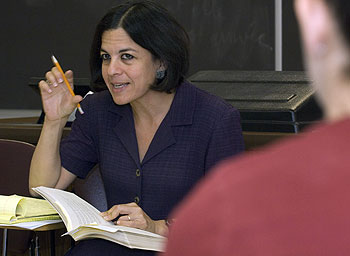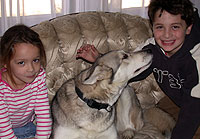For Hebrew literature scholar Nancy Berg, providing the keynote speech last month at an international conference on “Sami Michael and Jewish Iraqi Literature” was validation of a scholarly path she chose nearly two decades ago when she began her academic career at Washington University.
“Much of my work focuses on Israeli writers from Iraq, but when I started my career, people questioned whether this was a worthwhile topic of study — most scholars in my field only considered Israeli writers of European origin,” she says.

“Now, Israeli writers from Arabic backgrounds, such as Michael, are an accepted part of the Israeli literary canon. It’s exciting to see so many young scholars working in the sub-field and taking the research to new levels,” says Berg, Ph.D., associate professor of Hebrew and comparative literature in Arts & Sciences.
Since joining WUSTL in 1990, Berg’s scholarship and teaching have focused on writers who observe the world from the fringes of society — women in a male-dominated culture, religious and ethnic minorities living on the margins and exiles who never quite manage to feel at home.
By searching for meaning well beyond the traditional Israeli canon, Berg has helped bring new voices into that canon, challenging established norms and entrenched attitudes, both enriching and expanding our understanding of the interaction between Hebrew and Arabic literature and culture.
Her most recent book, “More and More Equal” (Lexington, 2005), examines the novels of Michael, the most significant Israeli writer to make the transition from Arabic to Hebrew. Born in Baghdad, Michael fled from political persecution in 1948, making his way to Israel, where he was long regarded as marginal writer of ethnic novels and children’s books.
Berg traces Michael’s development as a sophisticated storyteller, demonstrating how his novels use Arabs, non-European immigrants and other characters seldom found in mainstream Hebrew literature to raise critical questions about Israeli and Jewish identity, essentially recasting the Zionist master narrative.
Berg’s own personal narrative begins in her hometown of Boston, where a classmate first sparked her interest in Arabic culture by showing her how to write the Arabic alphabet. “I just loved the way the letters flowed across the page,” she says.

In high school, her first passion was biology, and she hoped one day to become a geneticist. “Gregor Mendel was my hero,” she says with a wry smile.
At the University of Michigan, Berg soon decided her interests lay outside the laboratory. She earned a bachelor’s in Near Eastern studies from the University of Michigan in 1983 and a doctorate in modern Hebrew and Arabic literature from the University of Pennsylvania in 1991.
Along the way, she met her future husband, Stanton Braude, now a lecturer in biology in Arts & Sciences. They have two children, Elizabeth, 8, and David, 11.
Berg came to WUSTL because the department was interested in someone who knew both Hebrew and Arabic. She was given the freedom to create her own approach to Hebrew studies.
“Most of my students are just learning the language, so I teach them how to look at the literature, to understand the central issues and discussions driving Israeli literature today,” Berg says.
In addition to her primary appointment in the Department of Asian and Near Eastern Languages and Literatures, Berg has affiliations with Arts & Sciences programs in Comparative Literature; Jewish, Islamic and Near Eastern Studies; and Women and Gender Studies.
She enjoys developing new courses but admits struggling with the process until she hits upon some unique angle or perspective from which to approach the subject matter. “I have to have my own hook,” she says.
Not coincidentally, Berg’s “hook” often is an unexpected one. In a Hebrew literature dominated by stories of fathers and sons, Berg explores the overlooked role of daughters, the writings of women observing a patriarchal society from the outside in.
Her course preparation often leads her into new research areas, and vice versa. Working with Marc Saperstein, a leading Jewish studies scholar formerly at the University, she co-developed and co-taught a course supported by a grant from the William T. Kemper Foundation on “Exile: Jews, Literature and History.” She and Saperstein are now co-editing an anthology of primary texts on the same topic.
Berg’s courses, such as “Israeli Women Writers” and “Israeli Culture and Society,” are popular with students from across campus. Ian Scheinmann, an Olin Business School graduate who took several courses with Berg, still remembers her passion for teaching and her students.
“You could tell that she really enjoys the subject matter and that she puts significant preparation into each lecture,” he recalls. “She shows a real affection for teaching.”
|
Nancy Berg Hometown: Boston Education: B.A., Near Eastern studies, University of Michigan; Ph.D., modern Hebrew and Arabic literature, University of Pennsylvania Family: husband Stanton Braude; son David, 11; daughter Elizabeth, 8 Hobbies: distance running, cross training, cooking |
Scheinmann, now a real estate attorney in Philadelphia, credits her with helping him better understand his Jewish identity and obtain a greater appreciation for Jewish culture throughout the world.
“She’s just a wonderful person, and we developed a strong relationship,” he says. “We shared an interest in Israeli politics, culture and history and had similar backgrounds of Jewish education. So much of her experience and her enthusiasm for these issues consistently came across in the classroom. It certainly left a lasting impression.”
Berg’s latest fascination is something she calls “the Israeli Gastro-narrative.” In world literature and film, she says, food has long been used as a metaphor for issues of class, gender and sex: lavish feasts and luxury foods identify the wealthy, women cook for their menfolk and eating with a voracious appetite can serve as a form of erotic foreplay.
In Israel, where the culture is very food-oriented, the gastro-narrative has evolved a uniquely Israeli flavor, one in which food serves as a marker for important ethnic, religious and political issues. Berg sees a gradual shift in how Israeli writers are using food as a symbol in their novels.
Modern Israeli writers, says Berg, no longer feel bound to use food as a symbol of individual sacrifice in the national struggle and instead are using it to explore much more personal issues, sometimes challenging basic tenets of the Zionist narrative.
In a recent novel, for instance, food becomes a sexual parody for a man torn between the affections of his wife and the woman next door, each forcing him to eat one lavish meal after another. Another novel unravels the connection between food and carnality, finally freeing food from having any national significance.
“Even when not feeding the national story, the symbolic use of food in Hebrew literature has a uniquely Israeli flavor,” she says.
Berg travels often to Israel to conduct research and give lectures. She also helps bring many Israeli writers to campus, ranging from the well known to rising stars, including the likes of Judith Rotem and Joshua Sobol.
Recently, while both were here for separate campus events, she “introduced” Israeli-American writer and University alumna Naama Goldstein with Etgar Keret, one of Israel’s leading new voices in literature and cinema.
“It was extraordinary to bring them together,” Berg says. “You don’t know what’s going to happen, but as it turns out, they were familiar with and admired each other’s work. It was amazing just to be there.”
In 2006, she curated a multicultural Israeli film series that was run by students. Earlier this semester, she brought Motti Lerner, one of Israel’s most provocative contemporary playwrights. This month, she brings back Michal Govrin, a leading Israeli novelist, poet and theatre director.
Always in the thick of things, Berg is heavily involved in committee work on campus, a role she appreciates in part because it allows her to build bridges.
“It’s rewarding to bring people together, to organize events that allow people from different programs and backgrounds to interact and explore common issues,” Berg says.
In Arts & Sciences, she served on the Faculty Council and Curriculum Committee. She currently serves on the board of the Center for the Humanities and on the University Judicial Board and was elected in 2006 for a three-year term as secretary of the Faculty Senate Council.
“Nancy is hugely smart, highly experienced and very knowledgeable about the University,” says Faculty Senate Council Chair Jeffrey Lowell, M.D., professor of surgery and of pediatrics in the School of Medicine. “She’s done a great job of communicating with faculty and keeping the council on task.”
Berg likes to think of the Faculty Senate Council as providing the chancellor with a shortcut for gathering feedback from thousands of faculty on campus.
“The stronger we are, the more we can contribute,” she says. “Stronger faculty government makes for a stronger university.”
While Berg prizes the University’s collegial environment, she’s not afraid to be a strong minority voice when necessary, says longtime colleague Rebecca Copeland, Ph.D., professor of Japanese language and literature in Arts & Sciences.
“Nancy is quick to champion the underdog and stand up for what she believes to be just,” Copeland says. “She works very hard to ensure that the University is mindful of its important role in society.”